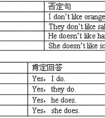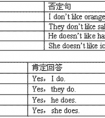动词填空。1. Can he _____ (sing) Beijing Opera? Yes, he can. 2. Look! The cats _____ (climb) the tree. 3. Uncle Jim is busy today. He _____ (not come) to -七年级英语
题文
| 动词填空。 |
| 1. Can he _____ (sing) Beijing Opera? Yes, he can. 2. Look! The cats _____ (climb) the tree. 3. Uncle Jim is busy today. He _____ (not come) to our party. 4. Peter _____ (live) two floors below Mary. 5. The thief tried _____ (run) away but the policemen _____ (catch) them in the end. 6. Go to the bookshop in the shopping mall, and you _____ (find) a lot of postcards there. 7. Is it difficult _____ (finish) _____ (work) out the problem in five minutes? 8. One frog like this has enough poison _____ (kill) about 2,200 people. |
答案
| 1. sing 2. are climbing 3. won't come 4. lives 5. to run, caught 6. will find 7. to finish, working 8. to kill |
据专家权威分析,试题“动词填空。1. Can he _____ (sing) Beijing Opera? Yes, he ca..”主要考查你对 实义动词,实义动词的单数第三人称形式,实义动词的过去式,不定式,动名词 等考点的理解。关于这些考点的“档案”如下:
实义动词实义动词的单数第三人称形式实义动词的过去式不定式动名词
考点名称:实义动词
- 实意动词:
即行为动词,表示动作的动词。实义动词与系动词是相对的,能独立用作谓语。
它分为及物动词和不及物动词两种:
及物动词是指后面要求有直接宾语的动词;
不及物动词指后面不需要跟宾语的动词。 实意动词使用方法:
及物动词
后面必须跟宾语意义才完整的实义动词,叫做及物动词(transitive verb)。如:
I believe that the committee will consider our suggestion.我相信委员会将会考虑我们的建议。
“How long can I keep the book ?”Harry asked.哈里问:“这本书我可以借多久?”
Dr. Bethune set us a good example. 白求恩大夫给我们树立了好榜样。
Crude oil contains many useful substances.原油含有许多有用的物质。
不及物动词
本身意义完整后面不须跟宾语的实义动词,叫做不及物动词(intransitive verb)。如:
Birds fly.鸟会飞。
It happened in June 1932.这件事发生于一九三二年六月。
My watch stopped.我的表停了。
She spoke at the meeting yesterday evening. 她在昨天晚上的会上发了言。
兼作及物动词和不及物动词
英语里有不少实义动词可以兼作及物动词和不及物动词。这样的动词又有两种不同的情况
a)兼作及物动词和不及物动词时,意义不变。试比较:
Shall I begin at once?我可以立刻开始吗?(begin作不及物动词)
She began working as a librarian after she left school.她毕业后当图书馆管理员。(began作及物动词)
When did they leave Chicago?他们是什么时候离开芝加哥的?(leave 作及物动词)
They left last week. 他们是上周离开的。(left 作不及物动词)
b)兼作及物动词和不及物动词时,有时意义不尽相同。如:
Wash your hands before meals.饭前要洗手。
Does this cloth wash well? 这布经得起洗吗?- 英汉实意动词用法比较:
与汉语的比较,有时英语动词的及物和不及物的用法,与汉语的用法不一样,请注意下列两种情况:
a)有的动词在英语里只能用作不及物动词,而汉语则可用作及物动词,如arrive到达,agree同意,listen听。英语里这些动词后面常接介词。如:
We arrived at the railway station at noon.
我们于中午到达火车站。(at不能省去)
(比较:We reached the railway station at noon.)
Everybody listened to the lecture with great interest.
每个人都很有兴趣地听讲课。(to不可省去)
(比较:We all heard the lecture.)
Do they agree to the plan?他们同意这个计划吗?(to不可省去)
b)有的动词在英语里能用作及物动词,而在汉语里则不能用作及物动词,如serve为…服务。
Our children are taught to serve the people wholeheartedly.
我们的儿童被教以全心全意为人民服务
用于be动词之后,实义动词之前。 实意动词的用法:
肯定句:
主语+动词过去式+其它
否定句:
主语+助动词didn‘t+动词原型+其他
一般过去式:
Did+主语+动词原型+其他
考点名称:实义动词的单数第三人称形式
在一般现在时的肯定句中,当主语为非第三人称单数时,谓语动词用原形;
当主语为第三人称单数时,谓语动词用单数第三人称形式。- 实义动词的一般现在时的单数第三人称形式遵从“s,es, ies”六字母规则。如下表所示:
实意动词单数第三人称变化规律:规则 动词原形 第三人称
单数形式s 一般在词尾加s(读音规则:
清清浊浊元浊,
在清辅音后读清辅音/s/,
在浊辅音和元音后读/z/)stop
take
clean
play
growstops/s/
takes/s/
cleans/z/
plays/z/
grows/z/es 以,x,ch,sh,或o结尾的动词
加-es(读/iz/)pass
fix
wash
watch
dopasses
fixes
washes
watches
doesies 以辅音字母
加y结尾的动词,变y为ies(读/iz/)fly
carry
hurryflies
carries
hurries
注意:不规则变化的有have—has, be—is, go—goes, do—does 一般现在时,当主语是第三人称单数时,谓语动词要用第三人称单数形式
主语是第三人称单数有以下几种情况:(1) 不可数名词做主语:
Some water is in the glass(2) 单个的可数名词做主语:
The girl is Chinese. My watch is on the dresser.
(3) He ,she , it 等代词单个做主语:
He is in the tree. She likes her family very much.
(4) 单个的人名,地名或称呼作主语:
Mary is a doctor. Uncle Li speaks a little English.
Changchun is a beautiful city.(5) 指示代词this, that 等作主语:
This is a pear. That is an apple .(6) Everyone, everything ,something, nobody, nothing.等不定代词作主语时
- 最新内容
- 相关内容
- 网友推荐
- 图文推荐
| [家长教育] 孩子为什么会和父母感情疏离? (2019-07-14) |
| [教师分享] 给远方姐姐的一封信 (2018-11-07) |
| [教师分享] 伸缩门 (2018-11-07) |
| [教师分享] 回家乡 (2018-11-07) |
| [教师分享] 是风味也是人间 (2018-11-07) |
| [教师分享] 一句格言的启示 (2018-11-07) |
| [教师分享] 无规矩不成方圆 (2018-11-07) |
| [教师分享] 第十届全国教育名家论坛有感(二) (2018-11-07) |
| [教师分享] 贪玩的小狗 (2018-11-07) |
| [教师分享] 未命名文章 (2018-11-07) |


![How much does it ______ to fly from Yancheng to Hainan Island?[ ]A. cost B. payC. spend D. take-七年级英语](http://www.00-edu.com/d/file/ks/4/2/shiyidongci/2020-01-05/small7dcf2f05998de63e10cc3629787031c81578210087.png)

![He always _____TV in the evening. He _____ listening to the radio. [ ]A. watch, don't like B. watches, doesn't like C. watching, don't like D. watch, do-七年级英语](http://www.00-edu.com/d/file/ks/4/2/shiyidongci/2020-01-05/small45d599b4a60b84e61cec210bfbf051f51578214524.png)
![I'd rather ___ to the Mcdonald's Restaurant because I like to listen to quiet music.[ ]A. to go B. going C. go D. went-八年级英语](http://www.00-edu.com/d/file/ks/4/2/shiyidongci/2020-01-05/small1767bba1727fef2c035c53dcbd9bc20e1578209517.png)
